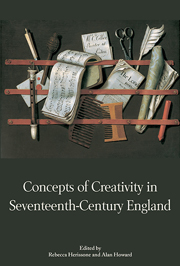Book contents
- Frontmatter
- Contents
- List of Illustrations
- List of Contributors
- Preface
- Introduction
- Creating to Order: Patronage and the Creative Act
- 1 ‘Big with New Events and some Unheard Success’: Absolutism and Creativity at the Restoration Court
- 2 Creativity on Several Occasions
- Creative Identity and the Role of Print Media
- Mapping Knowledge: The Visual Representation of Ideas
- Authorial Identity
- Imitation and Arrangement
- The Performer as Creator
- Bibliography
- Index
2 - Creativity on Several Occasions
from Creating to Order: Patronage and the Creative Act
Published online by Cambridge University Press: 05 March 2014
- Frontmatter
- Contents
- List of Illustrations
- List of Contributors
- Preface
- Introduction
- Creating to Order: Patronage and the Creative Act
- 1 ‘Big with New Events and some Unheard Success’: Absolutism and Creativity at the Restoration Court
- 2 Creativity on Several Occasions
- Creative Identity and the Role of Print Media
- Mapping Knowledge: The Visual Representation of Ideas
- Authorial Identity
- Imitation and Arrangement
- The Performer as Creator
- Bibliography
- Index
Summary
For artists of all kinds in the seventeenth century, creativity was most often called forth by an occasion: a royal wedding, a political crisis, a birth, a death, or a new publication requiring a frontispiece or encomiastic poem. Historicisms old and new have helped make those of us who study and teach the music, art and literature of this period more sensitive to those particular occasions than were the formalists who taught us. No active scholar today would put forward what used to be called the ‘generality theory of value’, which essentially held that truly valuable artworks could be understood without the footnotes. In more subtle ways, however, our modern readings of seventeenth-century artworks are still conditioned by the powerful Romantic myth of creativity, in which the artist supposedly makes the work because of personal inspiration, not because of a command or commission from a patron. As teachers, we tend to efface the fact that some poems by Dryden we like to praise as ‘personal’, such as the verses on the deaths of his friends John Oldham and Henry Purcell, were occasional pieces, printed only once. We are in some sense embarrassed that Purcell wrote ‘welcome songs’ on occasions including the King's return to London from the horse-races at Newmarket, although the music is beautiful. And we still tend to think of portraiture as a lesser genre than some other kinds of painting.
- Type
- Chapter
- Information
- Concepts of Creativity in Seventeenth-Century England , pp. 35 - 60Publisher: Boydell & BrewerPrint publication year: 2013

